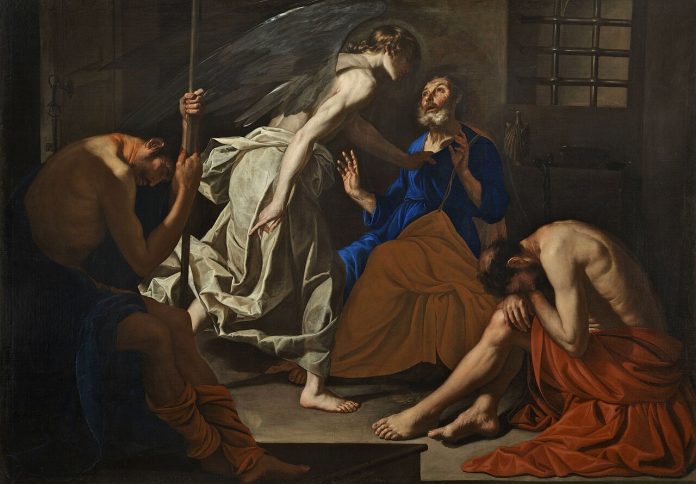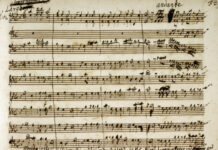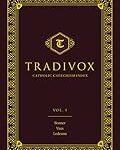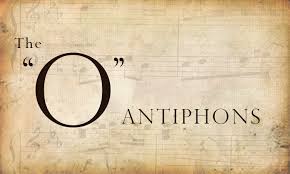(Besides being the memorial of the patron saint of moral theologians, Saint Alphonsus Ligouri, this August 1st is also the traditional feast of Saint Peter in Chains, or, perhaps more fully, Saint Peter being miraculously released from his chains, as recounted in the twelfth chapter of Acts. The two feasts are related, insofar as sin binds us, and Saint Alphonus’ doctrine helps free us from those spiritual chains. And here is a reflection on this feast, by Father Attard. For all of us so bound, may release be ours, by the grace of God).
Today’s feast, St Peter in Chains, helps us appreciate God’s faithfulness in Peter. One comes to really treasure this important fact when one reads carefully the first reading for this feast, namely Acts 12:1-11.
Peter lived in the tumultuous time of the Church’s beginnings. The Book of Acts tells us that about that time Herod the king laid violent hands upon some who belonged to the church. He killed James the brother of John with the sword; and when he saw that it pleased the Jews, he proceeded to arrest Peter also (Acts 12:1-3). Herod was determined to eliminate Peter because, in his view, if he managed to do that he would eventually help eradicate the Church herself. In verse 4 and 5 we see Herod’s plan being carried out. And when he had seized him, he put him in prison, and delivered him to four squads of soldiers to guard him, intending after the Passover to bring him out to the people. So Peter was kept in prison (Acts 12:4-5).
In verse five, Saint Luke, the author of the Book of the Acts of the Apostles, says: But earnest prayer for him was made to God by the church (Acts 12:5). Luke uses the adverb ἐκτενῶς (ektenōs) which in English it is translated as earnest or fervently. The Church literally prayed strenuously for Peter to be liberated. What this verse shows is that the primitive Church in Jerusalem made her own what Peter himself wrote in his First Letter: Finally, all of you, have unity of spirit, sympathy, love of the brethren, a tender heart and a humble mind (1 Pet 3:8). It was certainly this spirit of fraternal love which led this community, who was facing harsh persecution, to intercede for Peter with so much loving concern.
Psalm 37 tells us that the Lord loves justice; he will not forsake his saints. The righteous shall be preserved for ever (Ps 37:28). Hence, he sent his angel to set him free. This wonderous act by God manifests His loving faithfulness both for Peter as well as the Church who was praying for his release. The Book of Acts reminds us of the great obstacles that Herod purposely put in order that Peter might not escape. Verse 6 calls to mind that Peter was sleeping between two soldiers, bound with two chains, and sentries before the door were guarding the prison. Humanly speaking it was impossible for Peter to escape.
However God had another plan. This Bible text says in verse 7: And behold, an angel of the Lord appeared, and a light shone in the cell. The various of the verb ἐπέστη (epestē) are very telling. This verb can mean I stand by, am urgent, befall one (as of evil), am at hand, impend. How beautiful it is to think that God is helping Peter, through the angel, by standing by him urgently because of the evil which befell him. God’s response to Peter’s arrest is immediate. The angel drew attention to Peter by strik[ing] him on the side and woke him, saying; “Get up quickly”.
How many times God sent us people in our lives, his angels, to draw out attention to something. This they do because they want to see us free from those chains and live as children of God in his paternal freedom he created and imbued us with. Whenever we collaborate with his grace, as Peter did with the angel, we immediately realise that the chains fell off [our] hands (Acts 12:7). Not only that but we also realize that we have recovered back God’s fully fledged dignity as his sons and daughters as happened in Peter’s case when he believed the angel’s words: “Dress yourself and put on your sandals.” And he did so. And he said to him, “Wrap your mantle around you and follow me.” (Acts 12:8).
The emphasis of this text is that Peter went out and followed him (Acts 12:9). This is how God acts in our lives too. Through his angels he brings us to our senses and let us free. For God the iron gate (Acts 12:10) is no match to his power. In fact, as the Book of Acts tells us, it opened to them of its own accord, and they went out and passed on through one street (verse 10).
Mother Church gave us Psalm 34 for this feast to help follow the Lord through any kind of aid he sends us along our way to make us joyful and secure in his loving hands. We, who are poor and weak.
I will bless the LORD at all times; his praise shall continually be in my mouth. My soul makes its boast in the LORD; let the afflicted hear and be glad. O magnify the Lord with me, and let us exalt his name together! I sought the LORD, and he answered me, and delivered me from all my fears. Look to him, and be radiant; so your faces shall never be ashamed. This poor man cried, and the LORD heard him, and saved him out of all his troubles. The angel of the LORD encamps around those who fear him, and delivers them. O taste and see that the LORD is good! Happy is the man who takes refuge in him! O fear the LORD, you his saints, for those who fear him have no want! (Ps 34:1-9).
In times of great turmoil help us Peter to look at Christ and, as you did, we open ourselves to the aid he gives us. Pray for us to be humble in letting Christ save us the way he wants as you wonderfully did. Amen.












